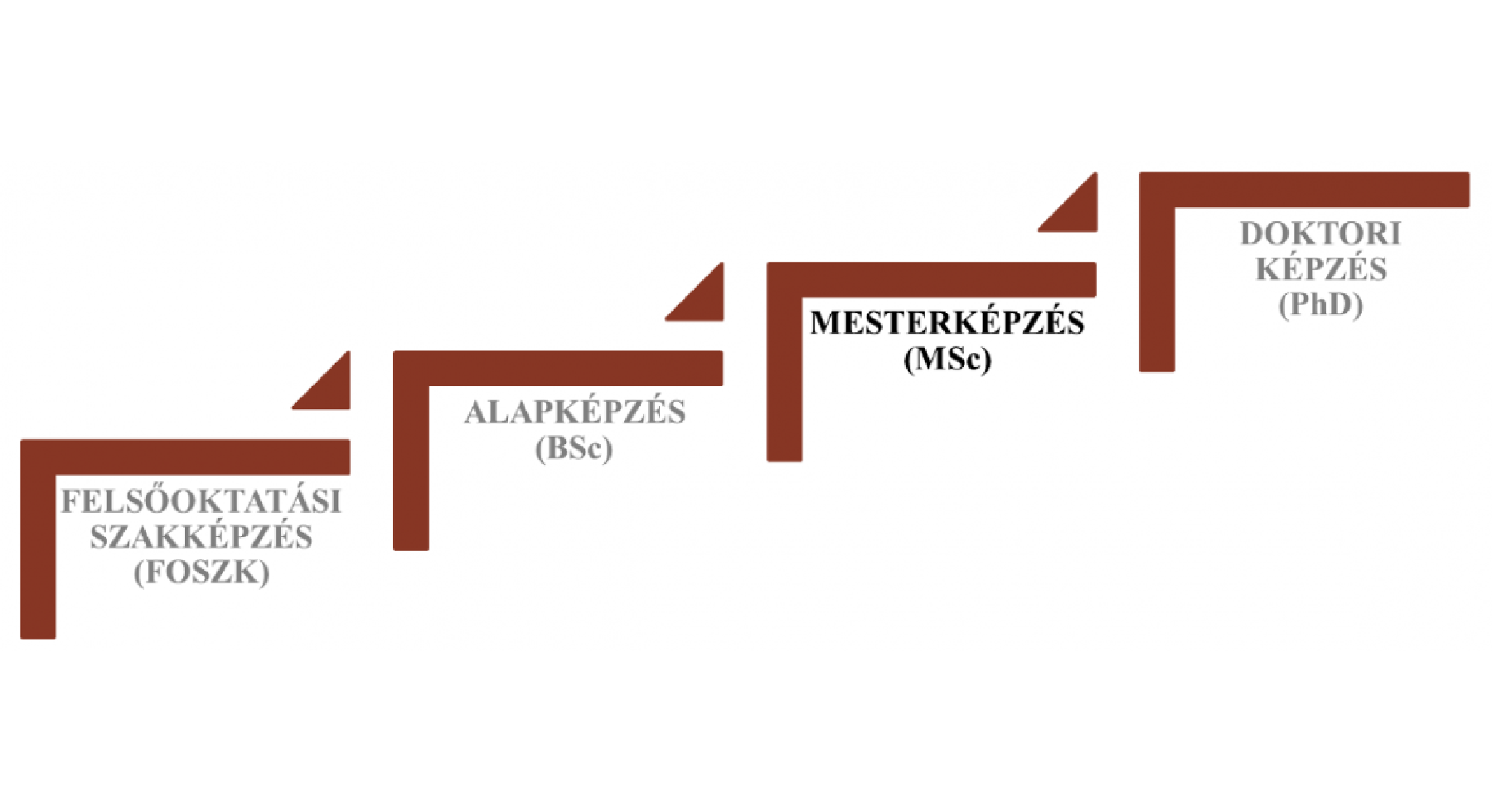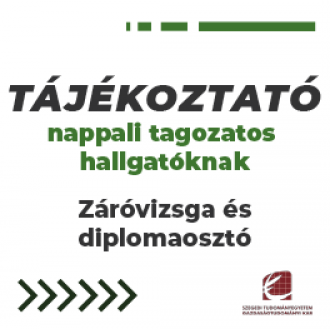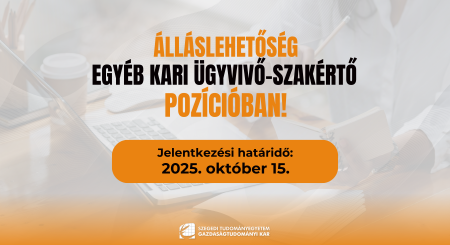
Information on the programme in English available here: http://www.eco.u-szeged.hu/english/training-programmes/programmes-for-international-students/international-economy-and-business-administration-ma
The courses in the programme fall under four different categories that, together with the thesis module, make up the 120 credits of the Master programme:
| Module | Credits | |
| A | Basic module | 25 |
| B | Program-specific core module | 35 |
| C | Elective courses | 37 |
| D | Optional module | 8 |
| Thesis module | 15 | |
| Total | 120 |
Modules A and B are compulsory, and contain courses of 5 credits each*:
| Semester I | Credits |
| Macroeconomics | 5 |
| Industrial Organization | 5 |
| International Political Economy | 5 |
| European Business Environment | 5 |
| Semester II | Credits |
| International Economics | 5 |
| Economic and Social Statistics | 5 |
| International Finance | 5 |
| Global Economic Trends and Centres | 5 |
| Modern Management and Marketing |
5 |
| Semester III | Credits |
| International Accounting | 5 |
| International Financial Management | 5 |
| International Human Resource Management | 5 |
| 60 |
*According to start in autumn. If starting in spring, the exact setup of compulsory courses is different but the composition is the same.
Modules C and D consist of elective programme-specific courses, and optional courses provided in related areas (Law, Political Science, Humanities). Of these, students have to complete as many so as to complete the required credits in those categories.
| Finance and Accounting Module |
|---|
| Green Finance and ESG Reporting |
| Analysis of Economic and Financial Data |
| Business processes in SAP S 4HANA |
| Risk Management in Finance |
| European Economic Studies Module |
|---|
| Energy in Europe |
| Competitiveness in the EU |
| European Competition, Trade, and Industrial Policies |
| European Economic and Monetary Union |
| Global Business Studies Module |
|---|
| Global Marketing |
| Modern China |
| Services and Intellectual Properties in the Global Economy |
| Internationalisation of firms |
| Freedom, Security and Justice in Europe |
| English for Academic Writing |
| International Week |
| Hungarian Language and Culture for Beginners I II |
From the elective courses, 37 credits have to be completed, which is possible in 3 ways:
1. Not following the modules, completing courses of personal interest
2. Completing one module and other courses
3. Completing two modules and one extra course
For the completion of modules, students receive diploma supplements (completing 2 modules implies 2 diploma supplements).
The courses offered within the defined modules are available without completing the whole module.
Consumer and firm behaviour: the work-leisure decision and profit maximization. A closed-economy one-period macroeconomic model. Economic growth: Malthus and Solow. Income disparity among countries and endogenous growth. A two-period model: the consumption- savings decision and credit markets. Credit market imperfections: credit frictions, financial crises, and social security. A real intertemporal model with investment. Money, banking, prices, and monetary policy. Market-clearing models of the business cycle. New Keynesian economics. Unemployment. Inflation, the Phillips curve, and central bank commitment.
International trade theory and policy. Labour productivity and comparative advantage: the Ricardian model. Specific factors and income distribution. Resources and trade: the Heckscher-Ohlin model. The standard trade model. External economies of scale and the international location of production. Instruments of trade policy. International movement of factors. Firms in the global economy. Exchange rates and open-economy macroeconomics. National income accounting and the balance of payments. Exchange rates and the foreign exchange market. Money, interest rates, and exchange rates. Fixed exchange rates and foreign exchange intervention.
What is new political economy? Socialist system and reform socialist models. Economic transition in Central and Eastern Europe and in the post-Soviet region. The Central and Eastern European model of capitalism. The impact of the 2008 global crisis on the Central and Eastern European countries. The Russian transformation. Commonwealth of Independent States. The Chinese market socialism.
The member states of the European Union. Enlargements of the EEC/EU. The EU in the world. The functioning of the internal market of the EU, the four freedoms, the Schengen Area. Main tools of the internal market, competition policy, liberalisation. Europe for citizens, Europe for businesses. Working abroad in the EU, posted workers. Brexit. The future of Europe, outlook.
Basic market structures: competitive market, monopolistic competition, oligopoly, monopoly. Levels of concentration and its consequences. Behaviour of market actors. Elements of market structure. Transaction costs and the theory of the firm. Information: perfect information vs. information asymmetries. Moral hazard, free-riding, rent-seeking. The principal – agent model. The structure – conduct – performance approach. The role of the state in a market economy. Antitrust regulation. Economics of regulation. State capture.
Introductions to economic statistics: definitions, technical terms, system of national accounts. Structure of input-output tables. Sectoral statistics: agriculture, services, industry, constructions, internal trade, transport. Social statistics: labour market statistics, indicators of the society: incomes, social and living conditions, heath, education. Government finance, fiscal and public sector statistics. International trade and balance of payments. Prices. Science and technology. Conjuncture.
Foreign exchange theory. Balance of Payments, convertibility. Exchange rate policy. Public defaults and bank crisis. International financial institutions: IMF, ESM, MIS, Word Bank, EBRD, EIB. History of monetary cooperation in Europe from Bretton Woods to the ESM. The monetary trilemma, monetary policy, central bank balance sheet. Foreign exchange reserves, theories about minimal reserve. Liquidity, financial stability. Debt crises. Basel II and III.
Globalization and global issues. International trade, FDI. Global economic centres: USA and Japan. Global economic centres: emerging economies. Developing countries. Economics of conflicts.
The characteristics of strategic decisions. The strategic position. The macro-environment in international context. Industries and sectors. Competitors and markets. Opportunities and threats. Strategic capability, capabilities for sustainable competitive advantage. International diversity and strategy. Perspectives of global business strategies.
International financial reporting systems and organizations of standard-setting and supervision. Harmonization procedures in international accounting. Structure and functions of the IASB. Financial Reporting regulations of the EU; the EU and the IFRS. Reporting under the IFRS: Presentation of Financial Statements, Accounting Policies, Cash Flow, Revenue, Property, Plant and Equipment, Impairment of Assets, Government Assistance, Provisions, Contingent Liabilities and Contingent Assets, Intangible Assets, Inventories.
Company valuation techniques. Internal and external capital. The international financial environment. Exchange rate risk management. Long-term and short-term asset and liability management. Mergers & acquisitions. Tax havens. Forecasting corporate defaults.
The organizational context. The context of cross-border alliances and SMEs. Staffing international operations for sustained global growth. Recruiting and selecting staff for international assignments. Performance Management. International training and development. International compensation. Re-entry and career issues. IHRM in the host-country context/International industrial relations. Culture: Perlmutter’s EPG model, Hofstede’s model. Strategy: Bartlett & Ghoshal model for strategic choices.
Approaches of communication. Negotiation and communication. What is culture? The role of culture in communication and negotiation. Differences in communication and negotiation across cultures. The synthetic culture model of G. Hofstede. Other relevant dimensions of cross-cultural differences: relationships, communication styles, time orientation, change tolerance, work – life balance.
Introduction to global marketing. Understanding the global marketing environment: cultural and social differences, political climate and regulations. Global markets and competition, market research and global market presence (market entry strategies, product, pricing, distribution and promotion strategies). Global marketing management. Marketing decision making and interpersonal skills in the global marketing context: analysis of strategic and operational global marketing problems; developing feasible courses of action; capitalizing on opportunities; critical decision making in teams.
History, different approaches, theories, the international system. States and intergovernmental organizations. Armed conflicts. Non-governmental organizations, individuals. Economic cooperation. Global problems.
The concept of competitiveness. Drivers of competitiveness at the different levels of economic development. Cost-competitiveness, structural competitiveness. The role of human capital and technology in competitiveness. The role of institutions in competitiveness. Measuring competitiveness. Indexes of competitiveness. The WEF GCI and the economics behind it (endogenous growth theory). The European integration process and its role in European competitiveness. The EU’s challenge: the internal competitiveness gap post-crisis.
Focus of language skills: being polite and being direct; accuracy; style; vocabulary; correctness; conciseness. Main topics: e-mails; memos; report; employment.
Economic models. Graphs, networks. Graph problems and their solutions (shortest path, spanning tree, maximum flow, circle, etc.). Optimization models (LP, ILP). Modelling in AMPL. Enterprise Resource Planning Systems. Critical Path Method. Program evaluation and review technique. Production models. Information visualization concepts and methods.
Global and European economic trends. Competitiveness. IP and Innovation (R+D+I). The economic importance and background of IP. Introduction into the role of intellectual properties in the global economy. The regulation of IP, international (TRIPs, DSU) and European institutional background (EPA). R+D+I on company level. The essentials of innovation. The effects of Industry 4.0 on company strategies. Services in general, different types of services related to other sectors of the economy. Services in international trade. The regulation of international trade in services (GATS, DSU). Services Directive in the EU. Services on company level, GVCs and services.
The theory of Optimum Currency Areas. The beginnings of European monetary integration. The Delors plan. The Maastricht convergence criteria. 1999-2009: the first ten years of the euro. The European Central Bank, the common monetary policy before the crisis, inflation-targeting. Economic policy coordination 1997-2010. The Eurozone crisis. The change in the ECB's role in the course of the crisis. European economic governance since 2011; the European Semester. The banking union. Plans, outlook.
Theories of market entry barriers, state of play in European industry, towards re-industrialisation. The history of European industrial policy, the lack of overall and common industrial policy(?), Europeanization of Industrial Policy. The effects of Industry 4.0 on EU industrial policy, readiness of countries to embrace Industry 4.0. The EU in international trade, the importance of trade. Trade policy in practice. Different fields of EU competition regulation and state aid policies.
Understanding knowledge. The Knowledge Management (KM) cycle. Knowledge capture and codification. Knowledge sharing. Knowledge application. KM models. The role of organizational culture. KM tools. KM strategy. Challenges for KM.
Private international law and international economic relations. Conflict of laws. WTO. International commercial arbitration. Vienna Convention, INCOTERMS. Leasing. Franchise. Distributorship contracts. International transport. International payments. International investments.
Social security. The Industrial Relations System. Collective bargaining and negotiation tactics. Direct action of employees, strike. Sources of labour law. Rights at work. Non-typical forms of employment.
Research and development in a historic perspective. Research and development as a common policy of the European Community in the Single European Act. The framework programmes since 1984. Horizon 2020. The emergence of the knowledge-based society in Europe. R&D in the Lisbon strategy. R&D in the Europe 2020 strategy. EU member states' performance in R&D&I. Research and development and technology transfer cooperation agreements in the EU’s competition policy. R&D&I and competitiveness.
With the use of the ESP ERP system, the following elements of integrated business management are covered: sales and distribution; financial accounting; materials management; production planning; controlling; enterprise asset management; human capital management.
Firms and globalisation. Formal and informal institutions. Economic, political and legal background. Firms’ resources. The strategy tripod. Theories of the internationalisation of the firm. Forms of the internationalisation of firms: export, foreign direct investment, other forms. Outsourcing, nearshoring, offshoring. Export and FDI. International markets. Entry modes, entry strategies. Internationalisation strategies. Headquarter-subsidiary relationships. International competition. Global value chains. Economic policy environment, investment promotion. Organisation of the internationalised firm. Importance of industry specificities.
Understanding of the major contemporary debates and theoretical perspectives on freedom, justice and security in a European context. Transferring knowledge about the theoretic foundation of the FSJ area of the EU and about the institutional framework of the EU in the field of Judicial and Home Affairs and possible future developments. Making understandable the role and activity of the Court of the European Union on this field. To establish general understanding how European Law interacts with national criminal justice systems. Strengthening the comparative approaches in this field in favour of better analysis of the own legal structures.
Theories of European identity and the European concept in political science from the 20th century. The process of the evolution of the European concept, the European integration and the European Union. Federalism. Main elements of the relations of the European powers, the concepts of the European communities and European plans of peace, and attempts of the federal associations. Main steps of the Europe-plans and European concepts, and its effect to the thinking about the European community in European history.
Models of democracy. Core principles of democracy. State traditions in Europe. Subnational democracy in Europe. The trust of people. Council of Europe legal texts. Committee of Regions in the EU. Division of powers between the European Union, the member states and local and regional authorities. Multilevel protection of the rule of law and fundamental rights.
This content course develops and refines the written academic English skills of students. The course also enables students to deal effectively with the written element of their academic study, as well as to develop other important skills such as reading research and critical thinking. The core course material is regularly supplemented by exercises for vocabulary and language usage specific to academic English.
The basic idea of the International Week (IW) course is that, on a particular week in each spring semester, students have the possibility to register for 4 mini-courses in various fields of Economics and Business, taught in English, delivered by foreign guest lecturers from partner institutions of the Faculty. It can be completed both in the first (IW I) and in the second (IW II) year of the Master studies.
The basic idea of the International Week (IW) course is that, on a particular week in each spring semester, students have the possibility to register for 4 mini-courses in various fields of Economics and Business, taught in English, delivered by foreign guest lecturers from partner institutions of the Faculty. It can be completed both in the first (IW I) and in the second (IW II) year of the Master studies.
Management science history and contemporary challenges. Management and entrepreneurship. Management functions of planning, organising in processes with specifics for international context. Management functions of influencing, controlling in processes with specifics for international context. Value creation in marketing; market research. Online marketing and social media. Global value chains & international organisations. Digitalisation, enterprise resource planning, digital enterprise, digital/virtual markets.
The relationship of human rights to business. The global system of human rights’ protection. Economic and social rights. International, European and domestic regulatory framework and guiding principles. Development state of the world (MDGs and SDGs). Digitalisation, social media and human rights. Corruption. Modern day slavery and child labour. Corporate social responsibility.
Value and positioning. Brands: elements and types. Branding techniques. Branding process and brand personality. Brand perception research.
The course aims to teach students how financial assets can be valued and corporate reporting can be adjusted to the zero-carbon emission objectives. Topics covered: concept of green finance; Dynamic Integrated Climate-Economy (DICE) model and financing the green transition; green monetary policy; green finance regulation; non-financial reporting; ESG.
The aim of the subject is to improve students’ data analytical skills. The following tools are covered: logistic regressions (binary and multinomial logistic regression), decision tree, network analysis, basic time series regression models (static models, lag models, trends and seasonality), serial correlation and heteroskedasticity (AR, ARMA, ARCH models), panel data methods (fix effect, random effect, dynamic panel models).
This course is designed to understand the key business processes in the SAP ERP system as well as the integration points across different SAP modules. As more and more businesses around the world adopt enterprise systems, it becomes increasingly important for students to develop a more process-centric perspective that reflects the realities of the modern business environment in which they will work.
The course aims to teach students the advanced corporate risk management achievements and challenges, risk research and management methods, and the use of these latter business activities and daily life. Covered methods and tools include the CAPM model; valuation methods; traders risk assessment; managing volatility, interest rate risk, market risk and credit risk; scenario analysis and stress testing.
The role of energy in the economy. Sources of energy. The Energy Union Package of the EU. Energy security, energy dependency. The Internal Energy Market of the EU. Energy efficiency. Decarbonisation of the energy sector. Renewable energy. Energy challenges, tendencies and international cooperation.
Elements of Chinese traditions, Confucianism. The concept of “Modern China”. Daily life. The role of the state in China. Marxism with Chinese characteristics. Phases of reforms. Economic miracle. Globalisation and WTO accession. The Belt and Road Initiative. 17+1 Cooperation Framework.
Under upload.
The aim of the course is to provide basic language skills which may be used in everyday communication and also serve as a good basis for further language learning. Grammar and vocabulary is selected with a communicative approach and the new grammar structures will be practised in situational exercises. The general pragmatic rules of language use are taken into consideration throughout the course, making students able to communicate in a socially acceptable way even on a basic level.
Jelentkezni elektronikus úton lehet, februárban induló képzés esetén november 15-ig, szeptemberben induló képzés esetén február 15-ig. A jelentkezéssel kapcsolatos tudnivalókról a www.felvi.hu oldalon, illetve a Felsőoktatási Felvételi Tájékoztató című kiadványból tájékozódhat.
A költségtérítés összege/félév, az első tanévben (önköltséges): 470.000,- Ft
A további tanévekben a költségtérítés összege legfeljebb az előző tanévben megállapított költségtérítésnek a Központi Statisztikai Hivatal által előző évre vonatkozóan közzétett fogyasztói árindexszel növelt összege lehet.
A belépéshez szükséges előzetes kreditelismerésre vonatkozó kérelmeket februárban induló képzés esetén január 11-ig, szeptemberben induló képzés esetén április 30-ig van lehetőség leadni a Tanulmányi Irodánkon. (Postacím: SZTE GTK Tanulmányi Iroda Maczkó Gabriellának 6722 Szeged, Kálvária sgt. 1.)

Maczkó Gabriella
tanulmányi előadó
Dékáni Hivatal
Tanulmányi Iroda
OH határozatszám: FF/1814-3/2013.
MAB határozatszám: 2007/8/XII/3/77.; 2016/1/VII/4/22








